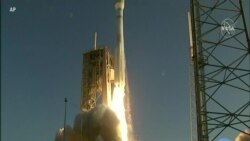NASA’s Perseverance probe landed safely and on time on Mars, at 3:55 p.m. EST, Thursday, marking another success for the U.S. space agency.
The nuclear-powered probe made its way through a harrowing landing process, deemed by some engineers as “seven minutes of terror” because it involves parachutes, powered descent and a “sky crane” that gently lowers Perseverance onto a challenging, rocky area of Martian surface.
After a confirmed safe landing, members of the probe’s Mission Control erupted in applause and cheers.
NASA has now successfully landed nine of 10 probes sent to the Red Planet.
Minutes after touching down, Perseverance beamed back a black-and-white image from the surface as more applause broke out at Mission Control.
The probe is equipped with a microphone, which should have recorded its descent.
Later Thursday, President Joe Biden sent a congratulatory tweet, saying: "Today proved once again that with the power of science and American ingenuity, nothing is beyond the realm of possibility."
Perseverance, and its helicopterlike companion drone, Ingenuity, began the 300-million-mile journey in July. Ingenuity will test if powered flight can be done in Mars’ thin atmosphere.
The six-wheeled Perseverance, which looks like the other four rover probes that have landed on Mars, set down in Jezero Crater, which is believed to be an ancient lakebed and a potential source for remnants of ancient life.
Determining if Mars once hosted life is the primary goal of the probe’s two-year mission.
During its search, the probe will take samples from the Red Planet’s surface and store them in its 43 sample tubes. NASA plans to send another mission to Mars to retrieve the tubes sometime in the early 2030s.
Before collecting samples, NASA will spend the next weeks making sure Perseverance’s systems are all working.
You can follow Perseverance’s progress on its Twitter account.






